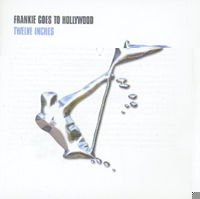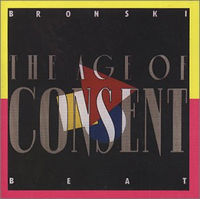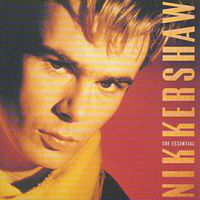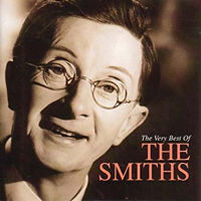Jason Maloney reviews
V o l u m e # 2 2 Chart Date: June 16th 1984 Online Date: 17th June 2004

Twelve Inches
The UK chart of 20 years ago was blitzed by the mighty Frankie Goes To Hollywood and their much-anticipated second single Two Tribes. Propelled by an extraordinary multi-tracked bassline (the result of endless production work by Trevor Horn) and plenty of striking Cold War imagery to complement the song’s lyrical concerns, Two Tribes swept aside Wham!‘s Wake Me Up Before You Go-Go to take top spot on its first week in the Top 40. Back then, this was still a rare and major achievement – the last single to do so had been Duran Duran‘s Is There Something I Should Know more than 12 months previously.
In the wake of Two Tribes’ sensational impact, the first Frankie release – a little track by the name of Relax – started climbing back up the chart again some 5 months into its run. Famously “banned” by Radio 1 at the beginning of the year when it had just cracked the Top 40 by entering modestly at #35, Relax went on top the charts for 5 weeks before going into gentle decline. By the week of May 12th it had fallen as low as #31, but then its resurgence occurred. At the time of Two Tribes’ debut at #1, Relax was on the cusp of the Top 10 once more, moving up 5 places to #11, and it wouldn’t stop there. Soon, Frankie would claim the top 2 positions on the UK rundown; Two Tribes’ 9-week reign included a fortnight in early July when Relax was #2.
The FGTH phenomenon overshadowed not only George Michael‘s first ever UK chart-topper, but also the return of Spandau Ballet. A year earlier, Spandau had staked their claim as one of the big three UK pop bands of the era, joining Duran Duran and Culture Club. True, their third album, had smoothed the rougher edges of their sound with lucrative results; the title track went to #1 on both sides of the Atlantic, while its follow-up Gold made #2. Only When You Leave was the first new material from the band in 12 months and had debuted strongly at #5, but it couldn’t compete with either Frankie or Wham!, peaking at #3 this week in 1984.

The Age of Consent
(plus extra tracks)
Frankie Goes To Hollywood and Bronski Beat were, of course, openly gay acts whose sound was rooted in the electronic dance music favoured by gay clubs: Hi-NRG. Two singles doing well in the top 20 were also drawn from the scene; Evelyn Thomas‘ self-explanatory High Energy was up from #9 to #5, while future Stock Aitken Waterman protégé Hazell Dean had just peaked at #6 the previous week with Searchin’ (I Gotta Find A Man) and now dropped to #12.

Nik Kershaw

Howard Jones
Throughout 1984, the pair were hardly ever out of the UK Top 40; Jones notched up 4 hits, Kershaw went one better with 5. On the chart of June 16th, the former was at a high of #7 with Pearl In The Shell, and the latter had the second-highest new entry at #18 with a re-issued I Won’t Let The Sun Go Down On Me. The single originally made #47 in September 1983, before Kershaw’s breakthrough in early 1984 with Wouldn’t It Be Good substantially raised his stock.

The Smiths
The Eighties was an uneven decade for Elton John; it began without much Top 40 success between 1980 and 1983, aside from the atypical croonsome ballad Blue Eyes which made #12, before a remarkable return to chart prominence with a brace of Top 5 hits from the Too Low For Zero album. Sad Songs (Say So Much) was the introductory single from its successor Breaking Hearts, and seamlessly extended Elton’s commercial renaissance by quickly hitting the Top 10 with an upward move of 4 places to #8. Breaking Hearts, unlike Too Low For Zero, spawned a few flops, but the overall momentum was only halted by 1986’s disastrous Leather Jackets set, which effectively relegated him from Pop’s premier division again until 1990.
Sister Sledge‘s We Are Family album and its handful of classic singles had graced the charts of 1979, helping define the inimitable sound of Chic’s Nile Rodgers and Bernard Edwards who fashioned the record. Five years on, history was to repeat itself, with a slight twist. Thinking Of You (up from #19 to #14) was not one of the trio of hits first time around, but Warner Brothers posthumously chose to release the erstwhile album cut as a single in May 1984. Its Top 20 success prompted reissues of Lost In Music (albeit given a contemporary overhaul by Rodgers) and the title track later on in the year, while the album itself returned to the chart in September and made a greater impact than before by reaching the Top 10.

Nick Heyward & Haircut 100
Outside the Top 20 on this week in 1984, Bananarama‘s Rough Justice (climbing 6 to a high of #23) wasn’t their worst chart performance to date, that honour befalling an earlier #45 flop Cheers Then, but it proved to be their last notable hit for some time. Dispelling the preconception of the three girls as purveyors of throwaway pop, the song’s lyrical content (written after the death of someone connected to the band in troubled Northern Ireland) sat a tad uneasily with the chiming Swain & Jolley production that had served them so well, not least just a few months previously with the #3 smash Robert De Niro’s Waiting. A transitional period ensued, with little chart action until Bananarama re-emerged in the summer of 1986 with Stock Aitken Waterman at the controls for the single Venus; a collaboration which would put the group back at the business end of the Top 40 for the rest of the 1980s.
Nick Heyward had quit Haircut 100 in pursuit of a solo career, but after three Top 20 hits during 1983 his fortunes began to fade; On A Sunday had proved a #52 flop at the end of that year, and now Love All Day (moving #37-#31) could only manage a modest placing. Things were going slightly better for David Sylvian, the former frontman of Japan; after a brace of orientally-flavoured hits in conjunction with Ryuichi Sakamoto – Bamboo Houses and the exqusite Forbidden Colours – his first bona fide solo single Red Guitar was charting at #25 (down from a high of #17).
There were four newcomers to the chart between #31 and #40; Scritti Politti‘s Absolute (in at #33) followed their breakthrough #10 hit Wood Beez, OMD were new at #39 with Talking Loud And Clear just a week after their previous hit Locomotion had departed the Top 40, and I Wanna Be Loved by Elvis Costello & The Attractions debuted at #40. Finally, one of the longest-running hits in the history of the UK Charts made its first appearance; Grandmaster Flash & Melle Mel with The Furious Five‘s White Lines (Don’t Do It) arrived at #36. The single would go on to reach #7 and spend almost a year on the Top 75.
Page Content copyright © Jason Maloney, 2004.
Reviewer of movies, videogames and music since 1994. Aortic valve operation survivor from the same year. Running DVDfever.co.uk since 2000. Nobel Peace Prize winner 2021.
